Game on: How “The Ballad of Songbirds and Snakes” brings young Coriolanus Snow to life in “Hunger Games” prequel
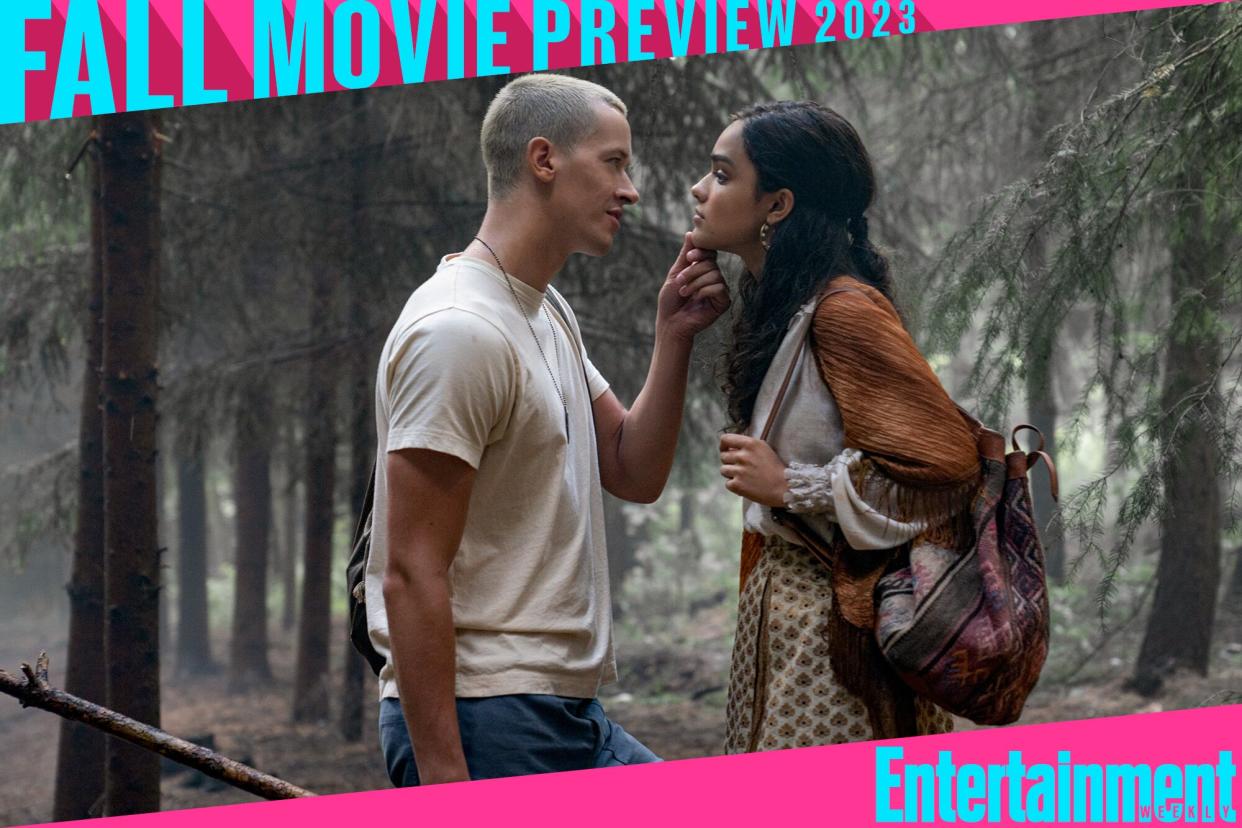
- Oops!Something went wrong.Please try again later.
- Oops!Something went wrong.Please try again later.
- Oops!Something went wrong.Please try again later.
- Oops!Something went wrong.Please try again later.
Murray Close/Lionsgate Tom Blyth as Coriolanus Snow and Rachel Zegler as Lucy Gray Baird in 'Hunger Games' prequel 'Ballad of Songbirds and Snakes'
Francis Lawrence felt like the odds were in his favor.
The director was in the middle of casting his adaptation of Suzanne Collins' Hunger Games prequel The Ballad of Songbirds and Snakes, and a London lunch meeting with West Side Story standout Rachel Zegler had just effortlessly evolved into a four-hour conversation. Lawrence walked away from that Soho meal last spring confident his top choice was eager to play heroine Lucy Gray Baird. Then she turned down the job.
The chance to work on the origin story of President Coriolanus Snow was appealing to Zegler, but she'd just gone through a precautionary COVID-19 quarantine by her lonesome in the U.K. to star in Disney's live-action Snow White, and that shoot was scheduled to wrap just three days before Songbirds and Snakes would begin. "The idea of going from six months in London to go deeper into Europe — into Poland — for another six months of her life freaked her out," Lawrence, 52, recalls a year later on a balmy late September afternoon in his office, a cozy refashioned one-story home tucked an arrow's shot away from Hollywood's Chateau Marmont. "She went ghostly white." He made promises ("We'll bring your boyfriend out!" "We'll bring your family out!" "We won't quarantine you!"), but the now 22-year-old was undeterred — until the summer of 2022 when it came time to cast Coriolanus' pal and classmate Sejanus Plinth.
After a galvanizing audition, Lawrence selected Josh Andrés Rivera, 28, for the wayward Academy pupil. "My assistant was like, 'Do you know who that is?' And I go, 'Yeah. He was in West Side Story,'" Lawrence recalls saying of the actor, who played Chino alongside Zegler in Steven Spielberg's 2021 remake. "She says, 'That's Rachel's boyfriend.'" Were the odds truly in his favor? The filmmaker thought to himself, Zegler "was almost at the end of her schedule. I bet she's seen the light at the end of the tunnel. Her boyfriend's going to be in Poland with us. I wonder if we're going to get a call."
They did.
And so Songbirds and Snakes had its leading lady. It may seem a daunting task to tell a new Hunger Games story without the other Lawrence, Oscar-winning actress Jennifer Lawrence, who propelled the blockbusters to well over $1 billion worldwide. But the director — who helmed the three Hunger Games sequels after Gary Ross' original — and franchise producer Nina Jacobson were actually entertaining the idea of exploring the origins of the survival-of-the-fittest games long before Collins produced her 2020 prequel novel, which introduced a younger version of the sinister President of Panem (played by Donald Sutherland in the first four films).
Lawrence admits he and Jacobson were "concerned" about centering a story around a reviled character, but the team continued to circle back to the singular and paramount truth that lives in the undercurrent of many villain origin stories: Bad guys don't start out as bad guys. It's that switch, that how and why, that they knew makes for rich and complex storytelling. It helped, too, that the creative team could not have found a more compelling snake to Zegler's songbird than Tom Blyth, the 28-year-old English actor best known for his roles on the TV Western Billy the Kid and coming-of-age film Scott and Sid. "Tom is extraordinary as the turn happens," Jacobson, 58, says of the leading man. "As he starts to break bad, as you start to see the man that he becomes breaking out of the shell of the man that he might've been, it's incredibly gratifying."
The new lethal lovers
Set 60 years before the Girl on Fire sparked a revolution, The Ballad of Songbirds and Snakes (or BOSS, for short) follows the 18-year-old future tyrant (Blyth) during his final year at the Academy, the elite secondary school in Panem's Capitol. Unbeknownst to his peers, the Snows — also comprised of cousin Tigris (Euphoria's Hunter Schafer) and their grandma'am (Fionnula Flanagan) — have fallen on hard financial times following the first civil war the districts waged against the Capitol. It's Reaping Day for the 10th annual Hunger Games, a televised spectacle wherein district children are forced to fight to the death as punishment for the insurrection, and Coriolanus has his eyes on the Plinth Prize. The cash reward, bestowed upon the mentor whose tribute emerges victorious, would all but secure his spot at the Capitol's university. Much to his displeasure, he's assigned to mentor Lucy Gray Baird, the female tribute from District 12, a region not exactly known for producing the cream of the crop.
But Lucy Gray is a member of the Covey, a group of musical nomads, and when she captures Panem's attention with a song at the Reaping, Coriolanus realizes he's got a wildcard on his hands — and that they just might have a shot at winning. It's the mentors' job to turn their tributes into spectacles amidst declining viewership of the games, after all. And Coriolanus realizes something else as well, something Hunger Games fans may find familiar: Much like with Katniss Everdeen (J.Law) and Peeta Mellark (Josh Hutcherson), indifference soon gives way to love between Coriolanus and Lucy Gray against the brutal backdrop of the games. "[Katniss'] draw to Peeta is this shared trauma," the director observes. "You go through an experience together and feel more understood by that person than anybody else. It's the same here." With Coriolanus and Lucy Gray, "there's this mutual need," he adds. "He needs her to win and survive so he wins. She needs him to help her win and survive so she survives." But also, it's… complicated. "There's manipulation on both sides."
It was around the time that Zegler signed on that Blyth's audition tape rolled in and, as Lawrence puts it, "blew everybody out of the water." It certainly helped, too, that the Juilliard alum bears some resemblance to a young Sutherland. And his chemistry with Zegler sealed the deal. "It was like, 'Okay, we got it,'" Jacobson recalls of her future stars connecting over Zoom — one in London finishing Snow White and the other dialing in from New York — and Zegler serenading Blyth with an acapella version of Carter Family's "Wildwood Flower," a wistful folk ballad about love lost. "To see how much he couldn't take his eyes off of her — she stunned him in the way that Lucy stuns Snow." After all, "their first moment of connection is a performance," Jacobson notes, citing the songbird's Reaping showcase. "They both wear masks for different reasons. They connect when they decide to perform together [and watch each other] perform for the moment. Tom and Rachel were really very capable of making those shifts and doing them with each other."
The snake's den
Lawrence really only had one note for his leading man: "I didn't want him to study early Donald Sutherland performances," he says. "I didn't want it to be mimicry in any way. I wanted him to play the part in the way that he would play the part."
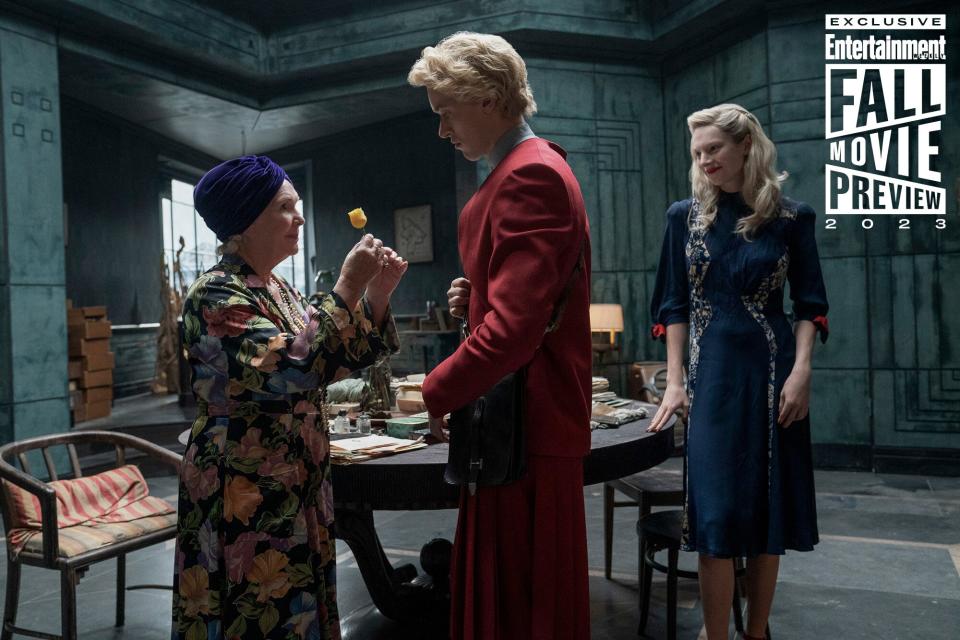
Murray Close/Lionsgate Fionnula Flanagan as grandma'am, Tom Blyth as Coriolanus Snow, and Hunter Schafer as Tigris in 'Hunger Games' prequel 'Ballad of Songbirds and Snakes'
Not yet fully corrupted by the world in which he lives, Coriolanus, like most young people, is still figuring out his life's path when BOSS begins. The student's virtues are shaped by those in his orbit, including Tigris, his closest confidant. She's certainly not the prized Capitol stylist we meet in Mockingjay Part 2 (brought to life in that film by Eugenie Bondurant). In the prequel, "she's trying to draw [her cousin] into goodness and keep him in goodness," Lawrence says of the character, now played by Schafer, 24, with an "endearing authenticity." (Though a number of actors read for the part, they were channeling Elizabeth Banks' Effie Trinket more than Tigris, putting on a "Capitol effect" that just felt "so phony," he laments.) Then there's Sejanus, Coriolanus' pal and a former district citizen who finds himself unraveling from the immorality of the games. "He's truly the most morally correct person in the movie, but there's a naivete to him that's unfortunate," Lawrence says. "He lacks the street smarts that somebody like Snow or Lucy Gray has, so he's constantly getting into trouble."
In stark contrast to these personalities are head gamemaker Volumnia Gaul (Viola Davis) and school dean Casca Highbottom (Peter Dinklage), who serve as adversaries to Coriolanus' virtues. With Volumnia, particularly, "we wanted to create a different kind of character, in terms of powerful women in these stories," Lawrence says. Whereas Julianne Moore's rebellion boss Alma Coin was a leader corrupted by power, Volumnia is a "strong believer in a very specific philosophy, and is grooming Snow in that direction," he says. It's important to note, too, that the filmmaker has never been one to view his antagonists as villains. "Even working with Donald playing Snow, a lot of people would say, 'He's villainous and evil.' But Donald and I never really thought of him that way," he explains. "I know, objectively, the character is. But these characters have to believe in their philosophies." Volumnia is resolute in hers: "She truly believes that at our core, humans are savage, and that's why we need the games. People need to be ruled with an iron fist."
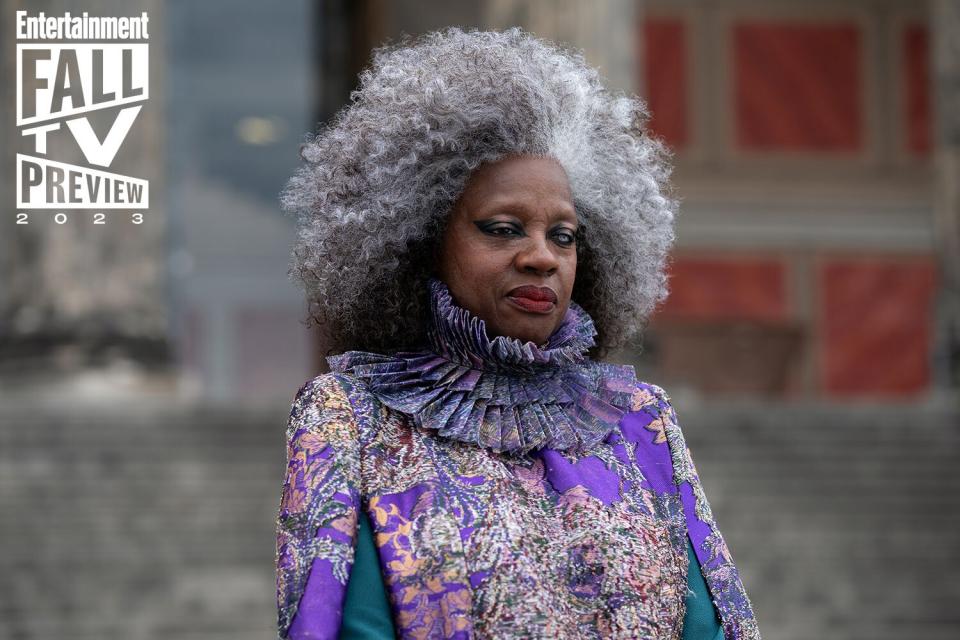
Murray Close Viola Davis as Volumnia Gaul in 'Hunger Games' prequel 'Ballad of Songbirds and Snakes'
"The twisted thing," he adds, "is that she finds joy and creativity in designing the games and making them more entertaining. So, she's truly the first real gamemaker to think outside the box." Casca, on the other hand, has ties to Coriolanus' father, a general who died during the war. They were once classmates who played a major role in the creation of the games, and Casca's contempt for the late Snow trickles down to his son. Lawrence hails Dinklage and Blyth's dynamic as some of his favorite scenes in the movie.
All these figures pull young Coriolanus in different directions, either "toward the darkness of Gaul's beliefs, toward the idealism of Sejanus' beliefs," or "toward the hope and warmth of Tigris' beliefs," Lawrence says. "Young people are always trying to find themselves, and what they find to be true about people and society."
And though we know how his story ends 60 years on, the director has full faith in audiences' appetite for a good villain origin story: "You look at the draw of stories like Macbeth and the downward spiral of that character, and you look at shows like Breaking Bad and the draw that [Bryan Cranston's Walter White] has, where you have a guy who has real problems and puts himself into a world and gets sucked further and further in until he really becomes a horrible person. They're just really appealing stories."
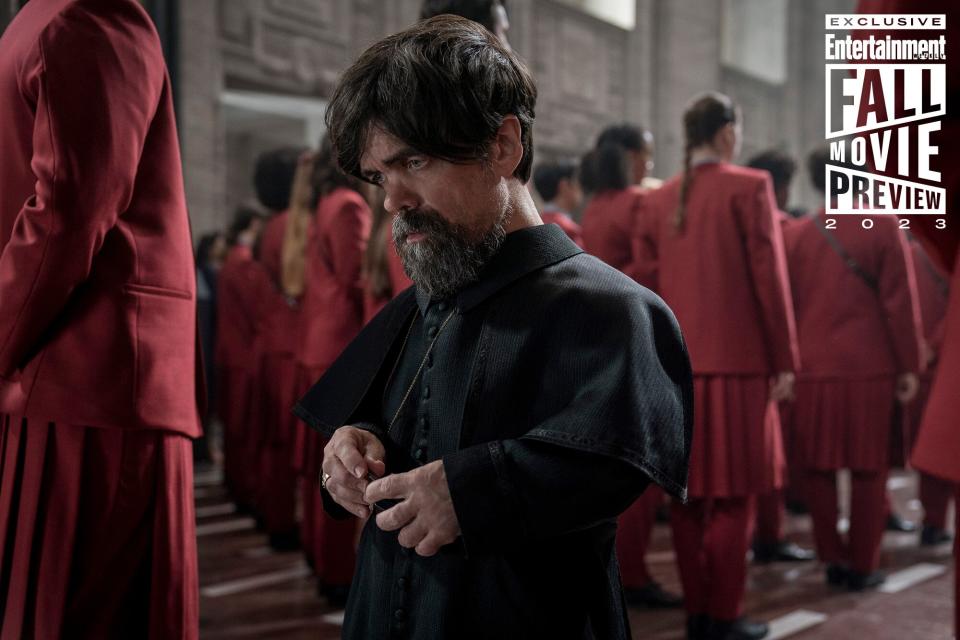
Murray Close/Lionsgate Peter Dinklage as Casca Highbottom in 'Hunger Games' prequel 'Ballad of Songbirds and Snakes'
"He is going to break bad," adds Jacobson. "You know exactly what's going to happen. There's no mystery. But the fact is you still so much want him to break good. There's something about that tension and the way you can be at war inside yourself as you're reading the book and watching the movie."
Like the gamemakers and technicians in the control room modifying the arenas, "We were always modulating how much we feel like we can get people rooting for him," Lawrence says of working on BOSS. "Suzanne would always ask us, or anybody that read early versions [of her prequel novel], 'How long were you with him? How long were you rooting for him?' I always kind of rooted for him until the end. Other people had different spots where they said, 'This is where he went bad, now I'm not empathizing with this guy anymore.' So, it was really just figuring out how to navigate that in a way where we keep people rooting for him as long as possible, but still understand and buy into the turn into darkness."
The songbird and the show
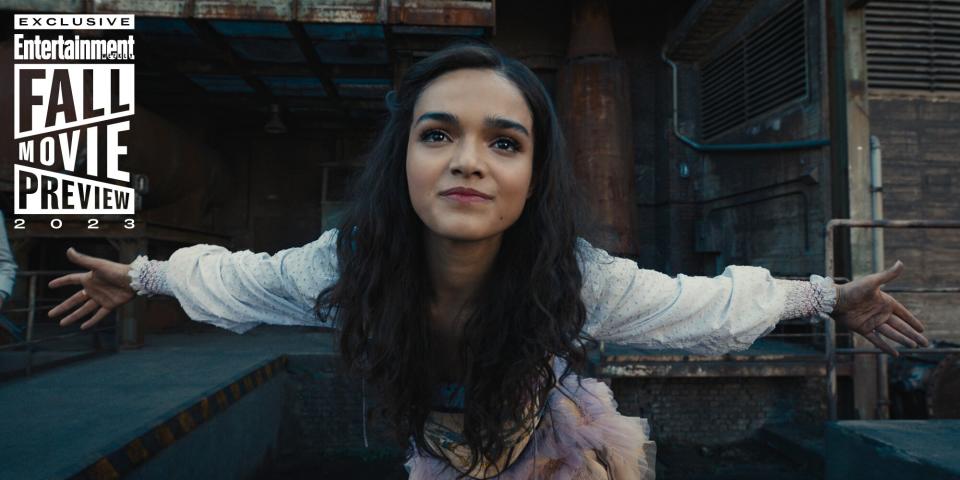
Lionsgate Rachel Zegler as Lucy Gray Baird in 'Hunger Games' prequel 'Ballad of Songbirds and Snakes'
When Lucy Gray and her fellow tributes step into the games' arena (filmed at Centennial Hall, a historical and imposing dome located in the Polish city of Wrocław), the battleground stands in stark contrast to the ones fans know from the previous films. It's a post-war reconstruction era as Panem rebuilds, so there are no vast and highly controlled jungle terrains, no spinning islands with hostile waters enclosed by inconspicuous domes, no sleek hovercrafts to pluck lifeless bodies from the arena floor. It's also long before the era of Careers, haughty tributes from wealthier districts who've trained their entire lives for the games. The reaped children are just that: children; far from militant. And don't expect fancy tribute uniforms, as the contenders are thrown into the arena wearing the same clothes from when they were ripped from their homes. "There's a much more individualized feeling through all of them, and you get a stronger sense of personality," Lawrence says. "These are just normal people. Some happen to be strong and good at fighting, some can't even use their legs and are just crumpled on the ground crying." It's these elements that make that sequence harder to stomach.
But there's levity to the brutality in the form of this year's emcee, Lucretius "Lucky" Flickerman (Jason Schwartzman), an ancestor of Stanley Tucci's Caesar Flickerman. Schwartzman played a major role in the screen development of the zany showman, who wasn't nearly as fleshed out in the initial script. "There was a lot of riffing and crafting" in order to "make more of a meal" of the character, Lawrence says of working with Schwartzman, who referenced footage of vaudevillian magicians and news anchors from the '70s and '80s. "He probably did the most homework out of anybody." But, of course, "We always had the North Star of Stanley Tucci's performance, and knew that we wanted it to feel like this character was aiming at Stanley Tucci. You could feel the origins of the host and how it could inform two generations later."
The Flickerman bloodline is one of several callbacks to the original franchise, the most striking being the reintroduction of "The Hanging Tree." Katniss first sings the ballad in Mockingjay Part 1 while filming rebel propaganda to rally allies. It's revealed in the prequel that the song originates from Lucy Gray, who pens the haunting ballad after witnessing the execution described in the song.
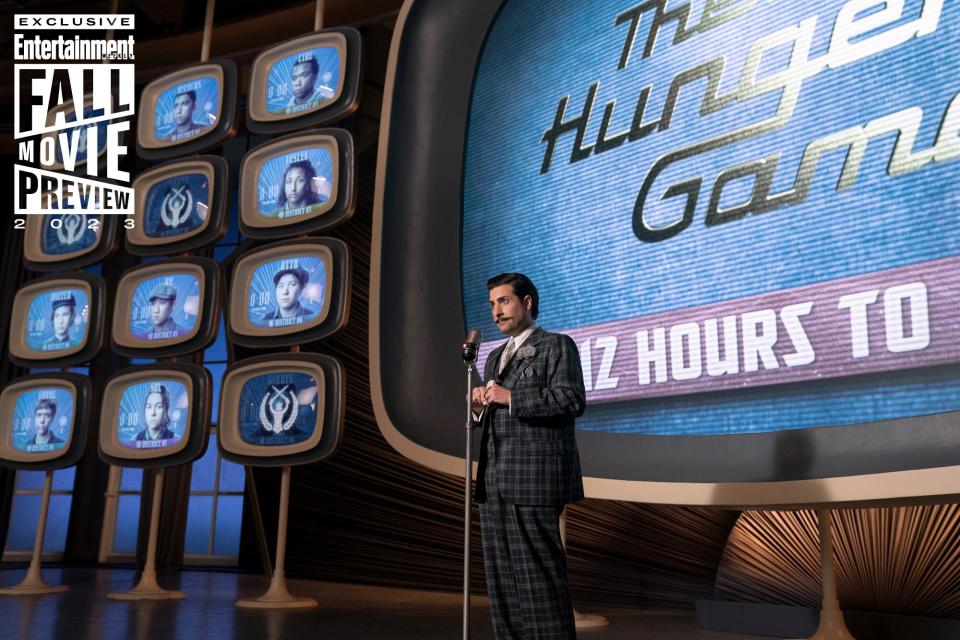
Murray Close/Lionsgate Jason Schwartzman as Lucretius "Lucky" Flickerman in 'Hunger Games' prequel 'Ballad of Songbirds and Snakes'
Music, of course, plays a more prominent role in the prequel given the songbird's Covey background. To craft the ballads of the musical nomads, producer Dave Cobb and the creative team drew heavily from Appalachian-country folk music, while early Dolly Parton and Sissy Spacek's Loretta Lynn (from the 1980 musical-drama Coal Miner's Daughter) informed Lucy Gray's sound. (Collins, as it turns out, is a huge country music aficionado.) Zegler even sang all of Lucy Gray's musical numbers live throughout filming, which often made for rousing days on set. Lawrence recalls the West Side Story powerhouse reducing some of the crew to tears during one particularly grandiose musical moment in the arena: "It gave everybody chills."
Other callbacks were less intentional. At the Reaping, Lucy Gray concludes her song with a defiant curtsy, mirroring Katniss' gesture in the first Hunger Games after she shoots her arrow through an apple tucked in a roasted pig's mouth. The big moment is not in the book, nor was it even in the script. Lawrence and Zegler — both inspired by the idea that Lucy Gray's gesture became a widely told tale passed down through generations — decided to add the curtsy on the day of filming.
Then there's the wickedly apt inclusion of Sutherland's voiceover: "It's the things we love most that destroy us." Coriolanus says this to Katniss in Mockingjay Part 2 after Peeta and other captive victors are extracted from the Capitol, to forewarn of Peeta's brainwashing. The line also poignantly encapsulates Coriolanus and Lucy Gray's love story, which does not have the same happy ending as Katniss and Peeta. "I remember being blown away by it and how it perfectly fit the themes and mysteries of the movie that we were making," Lawrence says of the line, which was added to the BOSS trailer by the Lionsgate marketing team. In fact, he was so impressed by its relevance that he added it to the final cut of the film as well.

Lionsgate Tom Blyth as Coriolanus Snow in 'Hunger Games' prequel 'Ballad of Songbirds and Snakes'
The future of Panem
With the prequel hitting theaters in less than two months, Jacobson concedes there are anxieties about how BOSS will be received by Hunger Games fans devoted to the original films and their stars. ("Katniss is so hugely identified with the franchise, so a story that doesn't have her in it is always going to be a big step for an audience," she says.) But the producer is proud of the approach that was taken in choosing to move forward with the prequel, which was simply: "If we cannot get to a place where we feel we have a story that is worthy of the franchise, we just won't do it."
As for whether she'd return to Panem in the future, should Collins have more lore to tell, Jacobson offers a resounding "hell yes." "If she has something to say, I want to hear it," she declares, quickly noting that Collins has never been one to crank out a book for the sake of it. "Like Lucy says, 'I don't sing when I'm told to. I sing when I have something to say.' That's Suzanne," Jacobson explains. Lawrence shares the producer's sentiments. "If Suzanne has another thematic idea that she feels fits into the world of Panem — whether with new people or familiar characters — I'd be interested in being a part of it," he says. "But I don't have any pull of just going, like, 'I would love to do Finnick's games.' What are the thematic underpinnings that make it worth telling? The original ones were all about the consequences of war. [BOSS] is about the state of nature. That's what makes them feel rich — and why they've stood the test of time."
The Hunger Games: The Ballad of Songbirds and Snakes arrives in theaters Nov. 17.
Video interviews for this story were conducted prior to the start of the SAG-AFTRA strike.
Related content:

